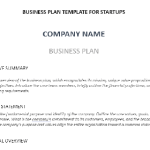We are an award winning product design consultancy, we design connected products and instruments for pioneering technology companies.
A free business plan template to help articulate your goals and attract investors
Reading time 7 mins
Key Points
- A business plan is a powerful communication tool and roadmap for success.
- It outlines a company’s goals, strategies and operational details and helps to attract funding or investment support by demonstrating the business’s viability and potential return on investment.
- A well-developed business plan compels entrepreneurs to think strategically about every aspect of their venture – from market analysis to financial projections – and helps them articulate their business concept, mission, and unique value proposition.
- By outlining the startup’s organisational structure, roles, and responsibilities, business plans help create a cohesive team and ensure everyone is aligned with the company’s objectives.
- Although it provides a structured framework, a business plan encourages adaptability – allowing entrepreneurs to remain flexible and responsive to market changes
- The startup failure rate in the UK is approximately 60%. The main reasons are cash flow problems, failure to identify target customers and their needs, a lack of market demand and operational inefficiencies.
- While not a guarantee for the overall success of a business venture, business plans help businesses identify problems and mitigate risks.
Need help with new research, development, and testing to get your product to market faster? Call us for a quote!
Ben Mazur
Managing Director
I hope you enjoy reading this post.
If you would like us to develop your next product for you, click here
Traditional business plans are increasingly viewed as an outdated waste of resources: spending time on lengthy paperwork slows down the process of getting a product to market, runs the risk of becoming obsolete in the face of rapidly changing market conditions, and often goes unread by the investors it was created to attract. That being said, a 60% UK startup failure rate suggests that contributing factors (e.g. lack of cash flow and poor market demand) could have been identified and mitigated had a robust business plan been implemented. Our free business plan template is aimed at helping entrepreneurs communicate and document their goals, strategies, and financial projections to attract investors while retaining the flexibility needed to adapt to market changes.
Related templates
Free product/market fit template to ensure you’re meeting customer needs
A free profit and loss template to help assess the health of your business
A competitor analysis template to fine-tune your unique selling points
While developing a detailed business plan is time-consuming, there are numerous benefits.
- Demonstrates the market opportunity, competitive advantage, and financial viability.
- Attracts the support and trust of external partners and investors.
- Allows business owners to articulate and communicate their goals and objectives with all stakeholders (e.g. investors and employees) and ensure everyone is on the same page.
- It helps company executives to manage current and future financial projections.
- Helps to control spending as budgets are set and outlined within the plan.
- Helps pinpoint the target market’s characteristics, allowing resources (e.g. advertising) to be allocated more effectively.
- Traditional business plans are a requirement for many sources of funding (e.g. bank loans).
Traditional Business Plan vs. Lean Business Plan
Generally, startups draft a business plan for three reasons: to articulate their vision for the company, document how they plan to solve critical challenges and pitch their business idea to potential investors. For startups and entrepreneurs in the early stages of product or service development who need to validate their concepts and get products to market quickly, who haven’t had the time or experience to develop detailed financial projections, a traditional business plan isn’t necessarily the most effective option to articulate, document, and pitch their business.
In one of our previous posts, we provided a free lean business plan template and discussed the differences between lean and traditional models.
Lean Business Plan
A streamlined, focused 1-2 page document that typically consists of key elements essential for decision-making and communication. It’s designed to be a flexible tool that evolves as the startup progresses. Key characteristics:
- Conciseness: Lean plans are concise, emphasising brevity over exhaustive detail.
- Focus on key components: They typically cover crucial elements such as business concept, target market, value proposition, key metrics, and the fundamental strategies for success.
- Adaptability: Lean plans are more flexible and are designed to be easily adjusted as the business evolves.
Traditional Business Plan
A comprehensive, detailed document of up to and over 15 pages that thoroughly outlines all aspects of a business. It’s a formal document often used for seeking funding from investors or lenders. Key characteristics:
- Comprehensiveness: Traditional plans are detailed, covering various elements such as market analysis, organisational structure, and a comprehensive financial forecast.
- Structured format: They follow a structured layout, often including sections like executive summary, mission statement, market analysis, organisational structure, competitor analysis, marketing and sales strategies, and financial projections.
- In-depth analysis: Traditional plans provide an in-depth analysis of the market, competition, and potential risks.
The choice between a Lean Business Plan and a Traditional Business Plan depends on the nature of your startup, its goals, and external requirements, such as investor expectations or loan requirements. Some startups may succeed with a lean and agile approach, while others, especially those seeking significant external funding, may benefit from the depth and formality of a traditional plan. Ultimately, the key is to strike a balance that aligns with the startup’s needs and the expectations of its stakeholders.
How to use our free business plan template
Download our free business plan template for a customisable tool that you can use to create and customise a structured framework for your startup. Key elements include:
A. Executive summary
B. Mission statement
C. Financial overview
D. Company overview
E. Product/services detail
F. Sales/pricing structure
G. Marketing strategy
H. Competitor analysis
I. Team (i.e. management and staffing structure)
J. Startup expenses
K. Financial projections
L. Funding request
M. Appendix
Each section includes a description of the information needed, tables to help you present it, and links to related templates to help compile further documentation. While the business plan template offers numerous advantages (e.g. time-saving, consistent structure), it’s essential to remember that customisation and careful consideration of the specific needs of your business are crucial. Templates are tools, and the ultimate success of your plan depends on the depth of thought and analysis you put into customising and refining it to fit your unique business circumstances.
 Free business plan template
Free business plan template
Download our free template
Final thoughts on business plans
Crafting a business plan for your startup is crucial to turning your vision into a successful reality. This free business plan template provides a solid and comprehensive foundation for startups to articulate their goals, strategies, and financial projections. Remember, a well-prepared business plan not only serves as a guide for your startup’s journey but also as a powerful tool to attract investors and stakeholders who believe in your vision.
If you found this post helpful, please share it!
Suggested articles
A lean business plan template for startups and entrepreneurs
How to find investors for your product idea
Scale your business: Growth strategies for startups exploring new heights
FAQ’s
Why is a business plan template important for startups?
A business plan template is crucial for startups as it provides a structured framework to outline business goals, strategies, and financial projections. It helps entrepreneurs clarify their ideas, set realistic objectives, and communicate their vision to potential investors.
How can a business plan template benefit small businesses?
A business plan template is beneficial for small businesses as it guides them in defining their niche, understanding their target market, and planning for sustainable growth. It serves as a roadmap, assisting entrepreneurs in making informed decisions and securing funding to fuel their ventures.
What should a good business plan template include?
A comprehensive business plan template should include sections on executive summary, company description, market analysis, organisational structure, product/service details, marketing strategy, and financial projections. These elements collectively provide a holistic view of the business and its potential for success.
How often should a business plan be updated?
A business plan should be updated regularly, mainly when significant changes in the business environment, market conditions, or company goals exist. Regular updates ensure the business remains aligned with its objectives and adapts to evolving challenges and opportunities.
Which industries benefit the most from a business plan?
All industries can benefit from a business plan, as it is a versatile tool that helps businesses in any sector define their purpose, strategies for success, and attract potential investors. It is particularly valuable for startups looking to establish a strong foundation.
What are the key components of a startup business plan template?
A startup business plan template should include a concise executive summary, a detailed description of the business concept, a market analysis, a solid marketing and sales strategy, an overview of the management team, and realistic financial projections. These components are essential for presenting a compelling case to investors.
Why do investors value businesses with a well-crafted business plan?
Investors value businesses with a well-crafted business plan because it demonstrates a clear understanding of the market, a strategic approach to challenges, and a realistic vision for growth. A comprehensive program instils confidence in investors about the startup’s potential for long-term success.
How does a business plan contribute to effective decision-making?
A business plan contributes to effective decision-making by providing a structured framework for evaluating options, weighing risks and rewards, and aligning choices with overall business goals. It is a reference point, ensuring that decisions align with the broader strategic vision.
What role does a business plan play in securing funding?
A business plan plays a crucial role in securing funding by presenting a compelling case for the viability and potential profitability of the business. It helps investors understand the business model, market opportunities, and the entrepreneur’s strategy for achieving sustainable growth.
When is the right time for a startup to create a business plan template?
The right time for a startup to create a business plan template is typically at the early stages of development before seeking funding or entering the market. A well-thought-out plan early on provides a roadmap for the business and facilitates strategic decision-making.
How can a business plan assist in setting realistic financial goals?
A business plan assists in setting realistic financial goals by guiding entrepreneurs through forecasting revenue, estimating expenses, and projecting profitability. This detailed financial planning ensures that goals are achievable and aligned with the business strategy.
What distinguishes a successful business plan from an average one?
A successful business plan is distinguished by its clarity, realistic projections, thorough market analysis, and a compelling narrative communicating its unique value proposition. It should showcase the entrepreneur’s understanding of the industry and the strategies to achieve success.
How does a business plan help in identifying potential challenges?
A business plan helps identify potential challenges by encouraging entrepreneurs to conduct a thorough SWOT analysis (Strengths, Weaknesses, Opportunities, Threats). This process enables proactive planning to mitigate risks and capitalise on opportunities, contributing to the business’s resilience.
Why is market analysis crucial in a business plan?
Market analysis is crucial in a business plan as it provides insights into the target audience, competitive landscape, and industry trends. This information is essential for entrepreneurs to make informed decisions, position their offerings effectively, and identify growth opportunities.
What is the significance of the executive summary in a business plan template?
The executive summary in a business plan template is significant as it serves as a concise overview of the entire plan, capturing the business’s essence and highlighting key points. It is often the first section investors read, influencing their decision to delve deeper into the details of the business proposal.
Who can benefit from using a free business plan template?
Entrepreneurs at various stages, from startups to small businesses, can benefit from using a free business plan template. It provides a cost-effective way to structure their ideas, define goals, and create a roadmap for success without the need for extensive financial investment in professional business planning services.
What resources are available for entrepreneurs to find a business plan template?
Entrepreneurs can find business plan templates through online resources, business development organisations, and government websites. Many templates are freely available, offering a starting point for entrepreneurs to customise based on their specific business needs and industry.
How does a business plan foster communication within a startup team?
A business plan fosters communication within a startup team by providing a shared framework for discussing and aligning goals. It helps team members understand the overall strategy, their roles, and how their contributions contribute to the company’s success.
What role does a business plan play in strategic partnerships?
A business plan plays a crucial role in strategic partnerships by articulating the business’s objectives, market positioning, and growth strategies. When seeking partnerships, a well-crafted plan can convey the value proposition and potential mutual benefits, fostering collaboration and shared success.

Get a quote now
Ready to discuss your challenge and find out how we can help? Our rapid, all-in-one solution is here to help with all of your electronic design, software and mechanical design challenges. Get in touch with us now for a free quotation.
Comments
Get the print version
Download a PDF version of our article for easier offline reading and sharing with coworkers.


 Free business plan template
Free business plan template
0 Comments